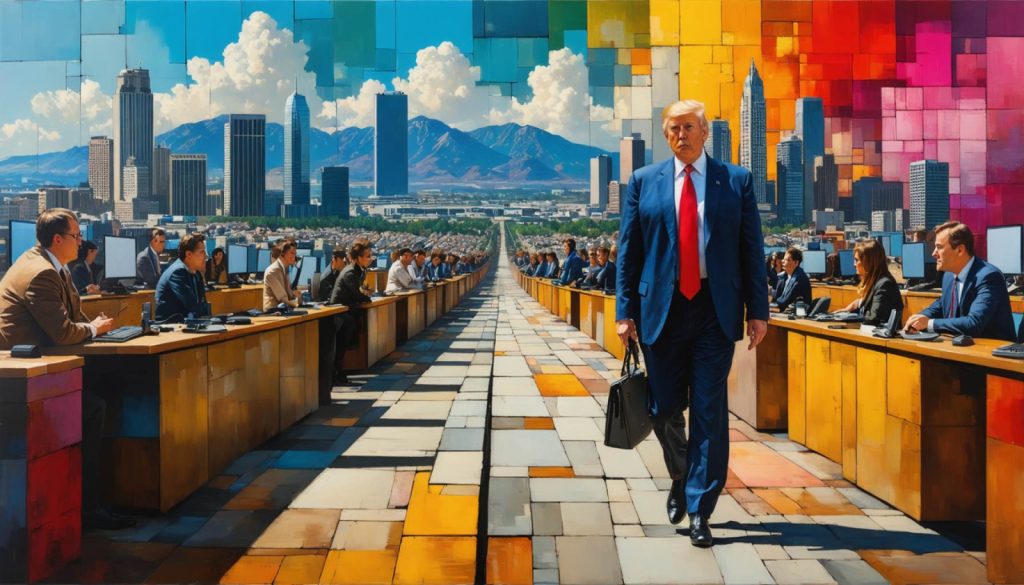
- Silicon Valley’s ideological and class divide is growing, with an evident shift from social idealism to corporate dominance.
- Jeremy Lyons and others have observed the change from startups with utopian visions to major corporations guided by market power.
- Executives like Elon Musk have aligned with political powers, diverging from past ideals, creating tension with workers.
- Activists like IdaRose Sylvester highlight issues such as rising inequality and environmental concerns linked to tech practices.
- Ann Skeet comments on the ethical divide between committed workers and opportunistic leaders in Silicon Valley.
- Despite some political shifts, Silicon Valley still leans left, reflecting ongoing identity struggles and calls for core values.
- The movement towards introspection among tech workers aims to rediscover the innovative spirit that once defined the region.
Jeremy Lyons, a veteran of the tech trenches, never fancied himself a firebrand. Yet there he was, at the break of dawn in downtown San Jose, amidst a sea of placards and passionate chants. The rally wasn’t his first—his political awakening began years ago among Google’s gleaming towers, spurred by a protest against immigration restrictions. But gone were the days when tech executives stood shoulder-to-shoulder with their workforce. Now, the tech landscape paints a fractured picture, revealing a Silicon Valley starkly divided by ideology and class.
What transformed this cradle of innovation? Lyons observes a metamorphosis that anyone steeped in the Valley’s lore might recognize. He witnessed the shift from idealistic startups heralding a utopian future to mammoth corporations driven by market dominance. Once the lair of socially-conscious code jockeys, Silicon Valley is now perceived as the kingdom of a few industry titans, indifferent to broader societal impacts.
Executives who once voiced dissent have pivoted toward political powerhouses. Musk, the epitome of futuristic ambition, became a vocal supporter of policies that many in the industry abhor. Some of his contemporaries, too, cozied up to corridors of power, an irony not lost on displaced workers who often refer to them with a mix of awe and skepticism.
For every tech darling who revels in their proximity to the powerful, there are countless others like IdaRose Sylvester who feel the sting of tech’s transformation. She lamented the dramatic rise in inequality and the environmental toll from endless data crunching. Her unease grew palpable last weekend, where Valley residents rallied, not just against political figures, but against symbols of their own domain.
Ann Skeet, a keen observer from Santa Clara University, discusses this evolving ethical conundrum, noting the widening chasm between line workers who cling to old ideals, and leaders who veer toward opportunistic politics. Their ethos, she suggests, remains rooted in the Valley’s origins—driven by innovation, yet increasingly marooned in disillusionment.
As Silicon Valley continues its tumultuous tango with politics, the once clear lines blur. The Valley’s voter base, historically a Democratic stronghold, saw a notable tilt with Trump at the helm, yet it still leans left, illustrating an ongoing identity struggle.
What does all this foretell for Silicon Valley’s next act? The allure of influence and the voracious tech economy has left its mark, but beneath this sheen of prosperity, there stirs a call for introspection—a reminder of the sincere pursuit of world-changing ideas. The protest echoes a reality: while some affluent leaders may have strayed from original ideals, the spirit of the Valley’s rank-and-file workers stays fervent, seeking to reclaim what once made their realm genuinely revolutionary. Amidst whispers of oligarchy and empowerment, one thing becomes clear—the Valley is still searching for its soul.
Silicon Valley: Divided Ideals and the Quest for Its Soul
The Transformation of Silicon Valley: A Closer Look
Silicon Valley, once synonymous with groundbreaking innovation and idealistic tech culture, is witnessing an ideological schism. This transformation reflects not just in politics but in corporate ethos and societal impacts.
What Led to the Divide?
In its nascent stages, Silicon Valley was populated with startups aiming to change the world for the better. Over time, expansion and corporate mergers have shifted many of these entities towards market domination over social responsibility. Executives who once championed progressive ideals now find themselves in power corridors, influencing policies that often conflict with their workforce’s values.
The Role of Political Alignment
The seeds of change are apparent in the shifting political affinities of Silicon Valley’s elite. Elon Musk, for instance, has been known for aligning with politically and socially conservative viewpoints, stirring debate within the industry. Meanwhile, the region, still predominantly Democratic, shows traces of political diversification—an identity struggle mirroring the industry’s evolution.
Pressing Questions and Insights
How has inequality affected Silicon Valley?
The tech boom has undeniably worsened social inequalities. The influx of wealth elevates housing prices, gentrifying neighborhoods, and pushing out longtime residents and low-income workers. This socio-economic disparity strains the Valley’s community fabric, leading to protests like those seen in past months.
What are Silicon Valley’s environmental impacts?
Endless data operations have drastically increased the Valley’s carbon footprint. Data centers require vast amounts of energy, raising questions about sustainability. Tech companies are turning to green energy solutions, but the transition is gradual, and the environmental toll remains a concern for activists.
Real-World Use Cases and Trends
Sustainability Initiatives in Tech
Many tech giants are investing heavily in renewable energy and sustainable practices. Google and Apple, for example, have lofty carbon-neutral goals. These efforts are essential in mitigating Silicon Valley’s environmental impact while maintaining operational efficiency.
Worker Movements and Union Efforts
With growing discontent, tech workers are increasingly pushing for unionization to address inequality and worker rights—an emerging trend reshaping industry dynamics. Union efforts, though resisted, represent a critical step towards restoring the balance of power.
Recommendations and Life Hacks
– For Tech Employees: Engage in active dialogue with leadership about company policies and sustainability. Consider joining or forming union efforts to collectively address disparities.
– For Executives: Maintain an open-door policy for feedback, aligning company policies with workforce values to prevent ideological drift.
– Sustainability Tip: Advocate for green office initiatives. Encourage remote work policies to decrease overall carbon emissions.
Conclusion
Silicon Valley stands at a crossroads, juggling its legacy of innovation with the pressures of socio-political and environmental challenges. The key to its rejuvenation lies in embracing its ethos of change and adapting it to today’s ethical standards.
Looking for more insights on tech transformations and trends? Visit Google for the latest updates in the tech landscape.



